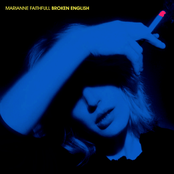Broken English

Biography
Style and Themes Faithfull’s immediately preceding albums, Dreaming My Dreams and Faithless (which in fact shared some tracks), had been in a relatively gentle folk or country and western style. Broken English was a radical departure, featuring a contemporary fusion of rock, punk, new wave and dance, with liberal use of synthesizers. After a number of years of drug abuse, Faithfull's voice was in a lower register, far raspier, and had a more world-weary quality than in the past that matched the...
Style and Themes Faithfull’s immediately preceding albums, Dreaming My Dreams and Faithless (which in fact shared some tracks), had been in a relatively gentle folk or country and western style. Broken English was a radical departure, featuring a contemporary fusion of rock, punk, new wave and dance, with liberal use of synthesizers. After a number of years of drug abuse, Faithfull's voice was in a lower register, far raspier, and had a more world-weary quality than in the past that matched the often raw emotions expressed in the newer songs. The album’s title track took inspiration from terrorist figures of the time, particularly Ulrike Meinhof of the Baader-Meinhof group. "Guilt" was informed by the Catholic upbringing of the singer and her composer Barry Reynolds. "The Ballad of Lucy Jordan", originally performed by Dr Hook, was a melancholy tale of middle class housewife's disillusionment; Faithfull's version became something of an anthem and was used on the soundtracks to the films Montenegro (1981) and Thelma and Louise (1991). "What’s the Hurry?" was described by Faithfull as reflecting the everyday desperation of the habitual drug user. Her cover of John Lennon’s "Working Class Hero", recorded as a tribute to her own heroes such as Mick Jagger and Keith Richards, David Bowie and Iggy Pop, and Lennon himself, was widely praised. The last track, "Why D’Ya Do It?", was a caustic, graphic rant of a woman reacting to her lover's infidelity. The lyrics began with the man's point of view, relating the bitter tirade of his jilted lover. It was set to a grinding tune inspired by Jimi Hendrix’s recording of Bob Dylan’s "All Along the Watchtower". Poet and writer Heathcote Williams had originally conceived the lyrics as a piece for Tina Turner to record, but Faithfull succeeded in convincing him that Turner would never record such a number. Its plethora of four-letter words and explicit references to oral sex caused controversy and led to a ban in Australia, where local pressings of the LP were released with smooth vinyl in place of the track and a 'bonus' 45 single as compensation (the ban did not extend to import copies). Release and Aftermath Broken English made #57 in the UK album charts and #82 in the US. "The Ballad of Lucy Jordan" was released as a single simultaneously with the LP in October 1979. The title track was issued as a single in January 1980. Faithfull included five tracks from the album on her 1990 live recording Blazing Away: "Broken English", "Guilt", "The Ballad of Lucy Jordan", "Working Class Hero" and "Why D'Ya Do It?". In 1996, "Witch's Song" was covered by Juliana Hatfield for the soundtrack of the film The Craft. An extended remix of the title track (5:46), released on 12" vinyl in 1979, remains unreleased on CD. Read more on Last.fm. User-contributed text is available under the Creative Commons By-SA License; additional terms may apply.
